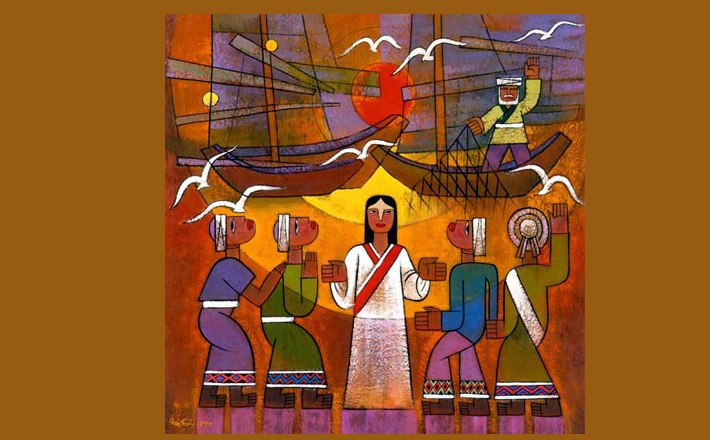Commentary on Matthew 4:12-23
This rich passage comprises four subscenes as the Gospel positions Jesus in Galilee (Matthew 4:12-16) and narrates the opening acts of Jesus’ public activity (Matthew 4:17-23).
Jesus in Galilee
Herod the tetrarch’s silencing of John means Jesus replaces John in Galilee (Matthew 4:12; 14:1-12). Jesus settles in Capernaum “in the territory of Zebulun and Naphtali” (Matthew 4:12). These names designate tribal allocations of Canaanite land that God had sworn to Abraham, Isaac, and Jacob, had shown to Moses (Deuteronomy 34:1-4), and were assigned by Joshua (Joshua 19:10-16, Zebulun; 19:32-39). These covenant-evoking names frame the land as divine gift yet this land is now occupied by imperial powers.
Verses 15-16 (citing Isaiah 9:1-2) evoke Isaiah 7-9 which addressed the Syro-Ephraimite crisis (735-733BCE). The northern kingdom (Ephraim/Israel) and Syria pressured Judah to join an anti-Assyrian alliance. Isaiah announced that God would use Assyria to destroy these two northern powers before God, in turn, destroyed Assyria. Light shining in the darkness represents God’s action to save the people and land from Assyrian rule.
This Isaiah text functions in Matthew 4:12-16 as an analogy for Rome’s empire. “Galilee owned by or under the Gentiles” now belongs to and is ruled by another Gentile empire. Roman control had been freshly asserted over Galilee in destroying Jerusalem and its temple in 70CE. Matthew’s Gospel, written in the 80s, cites Isaiah 9:1-2 to describe Roman rule as “darkness” and “death.” It positions Jesus, at the beginning of his public ministry, as the light or saving presence that shines in the darkness of Rome’s imperial domination. Jesus asserts God’s light or saving rule in Roman Galilee.
What does this light look like in the darkness and death of Roman rule? How does Jesus perform God’s saving presence and rule? The rest of the passage identifies three representative actions.
Jesus Declares God’s Empire
Jesus calls people to encounter God’s empire (Matthew 4:17). Interpreters have translated the Greek word basileia in various ways: kingdom, reign, rule, kingdom, empire. The translations reflect debates over the phrase’s meaning: divine action or space, present or future, already among people or not here yet. Several factors establish its meaning.
The phrase “the empire/kingdom of the heavens” is not common outside the Gospels. The idea of God as king who asserts sovereign rule among God’s people and the nations, however, is common in the Hebrew Bible. Psalms 95-99, for example, show God the king at work as creator, savior, and judge. They present God active and intervening in a world that does not live according to God’s purposes. God asserts God’s rule in saving the world.
The Greek word basileia (“empire/kingdom/reign”), though, is both imitative and contested since the word regularly refers to empires like Rome’s that assert rule over people and land. The Gospel’s use of the same term illustrates a common practice among colonized peoples. They often negotiate imperializing power by using native traditions to redefine its language to produce a similar yet different meaning. The Gospel imitates imperial language and structures (God’s dominating power) yet redefines them as the subsequent scene of Jesus’ healing and liberating power displays (Matthew 4:23-25).
The Gospel envisions God’s empire/kingdom as already established in the heavens. It is now being extended among humans in Jesus’ activity (“your will be done on earth as it is in heaven,” Matthew 6:10).
Jesus Calls Followers
Jesus’ then calls two sets of brothers to be his followers (Matthew 4:18-22). They are fishermen, embedded in the imperial economy. Rome asserted control over the land and sea, their production, and the transportation and marketing of their yields with contracts and taxes. Jesus disrupts these men’s lives, calls them to a different loyalty and way of life, creates a new community, and gives them a new mission (fish for people). His summons exhibits God’s empire at work, this light shining in the darkness of Roman-ruled Galilee.
The men’s immediate positive response in following Jesus is stark. Readers have imagined previous and extended conversations but such “solutions” destroy the dramatic urgency of the scene. More compelling is to recall the presentation of Jesus in previous chapters. As God’s agent, he is to manifest the light of God’s saving presence and empire/reign. Such initiative and gift are appropriately welcomed with an instant response.
Their call and accepting response anticipate other people who join Jesus’ followers (Matthew 10:1-4; 12:46-50). The Gospel’s almost-exclusive focus on male disciples is troubling. We must remember that women were also among Jesus’ followers. Matthew 27:55-56 indicates that women followers accompanied him in Galilee, so we must read their presence into all the Gospel scenes especially since the Gospel does not mention their presence.
Jesus Preaches and Heals
Jesus preaches and teaches the “good news” of God’s empire that has invaded Roman Galilee (Matthew 4:23). He also heals people’s diseases and infirmities. Verses 23-25 summarize this healing activity. Subsequently the Gospel will alternate summaries with scenes of specific healings.
Why are there so many sick people in the Gospel?
The Gospel reflects its imperial world at this point. Roman imperial structures and practices were bad for people’s health. Some 70-90 percent of folks in Rome’s empire experienced varying degrees of poverty — from the very poorest to those who temporarily fell below subsistence levels. Understandings of hygiene were limited; social stresses were high; water quality poor, food insecurity was rife with low quality and limited quantities. Such factors resulted in widespread diseases associated with poor nutrition (blindness; muscle weakness etc.) and a lack of immunity (diarrhea; cholera etc.). These kinds of diseases were death-bringing in a world that required physical labor for survival.
Jesus’ healings are acts that repair imperial damage and enact God’s life-giving empire in restoring people’s lives. They anticipate the completion of God’s working that creates a world, envisioned by Isaiah, in which all people enjoy abundant good food (Isaiah 25:6-10a) and physical wholeness, where “the blind receive their sight, the lame walk, the lepers are cleansed, the deaf hear, the dead are raised, and the poor have good news brought to them” (Matthew 11:5; Isaiah 35:5-6).


January 22, 2017